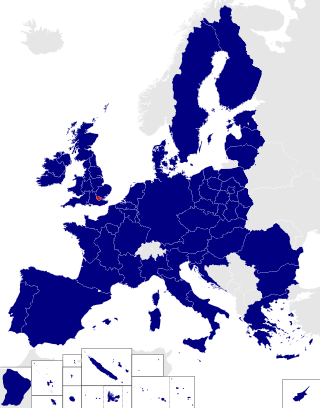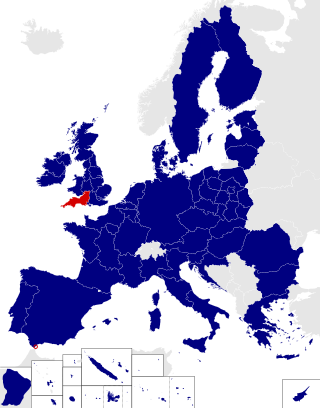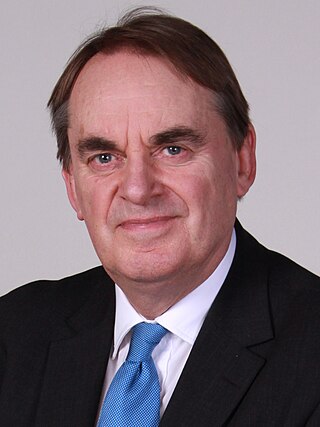Related Research Articles

The legislatures of the United Kingdom are derived from a number of different sources. The Parliament of the United Kingdom is the supreme legislative body for the United Kingdom and the British overseas territories with Scotland, Wales and Northern Ireland each having their own devolved legislatures. Each of the three major jurisdictions of the United Kingdom has its own laws and legal system.

The 2004 European Parliament election was held between 10 and 13 June 2004 in the 25 member states of the European Union, using varying election days according to local custom. The European Parliamental parties could not be voted for, but elected national parties aggregated in European Parliamental parties after the elections.

The 1999 European Parliament election was the United Kingdom's part of the European Parliament election 1999. It was held on 10 June 1999. Following the European Parliamentary Elections Act 1999, it was the first European election to be held in the United Kingdom where the whole country used a system of proportional representation. In total, 87 Members of the European Parliament were elected from the United Kingdom across twelve new regional constituencies.

The 2004 European Parliament election was the United Kingdom's part of the wider 2004 European Parliament election which was held between 10 and 13 June 2004 in the 25 member states of the European Union. The United Kingdom's part of this election was held on Thursday 10 June 2004. The election also coincided with the 2004 local elections and the London Assembly and mayoral elections. In total, 78 Members of the European Parliament were elected from the United Kingdom using proportional representation.
Glyn Ford is a British academic and Labour Party politician. He was a Member of the European Parliament (MEP) from 1984 to 2009, initially for Greater Manchester East until 1999, then South West England from 1999 to 2009.

Sir Graham Robert Watson is a British Liberal Democrat politician who served as a Member of the European Parliament (MEP) for South West England from 1994 to 2014. Watson was the chairman of the Parliament's committee on citizens rights, justice and home affairs (1999–2002). He then served for seven and a half years as leader of the Liberal Group in the European Parliament, first as leader of the European Liberal Democrat and Reform Party Group (2002–2004) and then as leader of the new Alliance of Liberals and Democrats for Europe Group (2004–2009). From 2011 until 2015, he was the president of the Alliance of Liberals and Democrats for Europe Party. From 2015 to 2020, he was a UK Member on the European Economic and Social Committee. He is currently an adjunct Professor at the University of Toronto's Munk School of Global Affairs and Public Policy.

In the United Kingdom (UK), each of the electoral areas or divisions called constituencies elects one member to the House of Commons.

Scotland was a constituency of the European Parliament created in 1999. It elected between eight and six MEPs using the D'Hondt method of party-list proportional representation every five years from 1999 until 2020. The constituency was abolished after the United Kingdom left the European Union on 31 January 2020.

London was a constituency of the European Parliament from 1999 until the UK exit from the European Union on 31 January 2020.

North West England was a constituency of the European Parliament. From the 2009 elections it elected 8 MEPs using the D'Hondt method of party-list proportional representation, until the UK exit from the European Union on 31 January 2020.

South West was a combined constituency region of the European Parliament, comprising the South West of England and Gibraltar. Seven, later six, Members of the European Parliament using closed party-list proportional representation allocated using the D'Hondt method of distribution were elected. The constituency was abolished when Britain left the European Union on 31 January 2020.

Wales was a constituency of the European Parliament. It elected 4 MEPs using the D'Hondt method of party-list proportional representation, until the UK exit from the European Union on 31 January 2020.

West Midlands was a constituency of the European Parliament. It was represented by seven MEPs using the D'Hondt method of party-list proportional representation. In 2009, the constituency was reduced to six seats, but also elected a "virtual MEP" who took her seat in the Parliament when the Treaty of Lisbon came into effect. The constituency was represented by seven MEPs prior to the 2009 election, until the UK exit from the European Union on 31 January 2020.

The 2009 European Parliament election was the United Kingdom's component of the 2009 European Parliament election, the voting for which was held on Thursday 4 June 2009. The election was held concurrently with the 2009 local elections in England. In total, 72 Members of the European Parliament were elected from the United Kingdom using proportional representation.

Cambridgeshire was a constituency of the European Parliament located in the United Kingdom, electing one Member of the European Parliament by the first-past-the-post electoral system. It was first created in 1979 for the first elections to the European Parliament, but was abolished in 1984 election.

Hertfordshire was a constituency of the European Parliament located in the United Kingdom, electing one Member of the European Parliament by the first-past-the-post electoral system. Created in 1979 for the first elections to the European Parliament, it was abolished in 1999 on the adoption of proportional representation for European elections in Great Britain. It was succeeded by the East of England region.

Norfolk was a constituency of the European Parliament located in the United Kingdom, electing one Member of the European Parliament by the first-past-the-post electoral system. Created in 1979 for the first elections to the European Parliament, it was abolished in 1999 on the adoption of proportional representation for European elections in the United Kingdom. It was succeeded by the East of England region.

The 2014 European Parliament election was the United Kingdom's component of the 2014 European Parliament election, held on Thursday 22 May 2014, coinciding with the 2014 local elections in England and Northern Ireland. In total, 73 Members of the European Parliament were elected from the United Kingdom using proportional representation. England, Scotland and Wales use a closed-list party list system of PR, while Northern Ireland used the single transferable vote (STV).

The 2019 European Parliament election was the United Kingdom's component of the 2019 European Parliament election. It was held on Thursday 23 May 2019 and the results announced on Sunday 26 and Monday 27 May 2019, after all the other EU countries had voted. This was the United Kingdom's final participation in a European Parliament election before leaving the European Union on 31 January 2020, and was also the last election to be held under the provisions of the European Parliamentary Elections Act 2002 before its repeal under the European Union (Withdrawal) Act 2018.

The European Union (Referendum) Act 2016 was an Act of the Gibraltar Parliament, which implements the United Kingdom's European Union Referendum Act 2015 in Gibraltar. It was the first time a referendum has been held in Gibraltar on the issue of continued EU membership since the territory joined along with the United Kingdom in 1973 and was the first time that any British Overseas Territory had participated in a UK-wide referendum. The Act commenced on 26 January 2016, and received assent from the Governor of Gibraltar on 28 January 2016.
